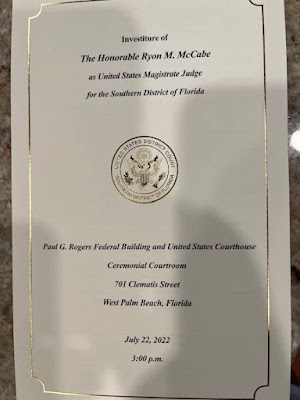…finally.
Here they are:
Judge Carlton W. Reeves: Nominee for Commissioner and Chair of the United States Sentencing Commission
Judge Carlton W. Reeves has served as a United States District Court Judge for the Southern District of Mississippi since 2010....
Laura Mate: Nominee for Commissioner and Vice Chair of the United States Sentencing Commission
Laura Mate has served as the Director of Sentencing Resource Counsel, a project of the Federal Public and Community Defenders in the Office of the Federal Public Defender for the District of Arizona, since 2021 and from 2010 to 2021 was a member of Sentencing Resource Counsel....
Claire McCusker Murray: Nominee for Commissioner and Vice Chair of the United States Sentencing Commission
Claire McCusker Murray served as the Principal Deputy Associate Attorney General of the United States Department of Justice from 2019 to 2021....
Judge Luis Felipe Restrepo: Nominee for Commissioner and Vice Chair of the United States Sentencing Commission
Judge Luis Felipe Restrepo has served as a United States Court of Appeals Judge for the Third Circuit since 2016....
Judge Claria Horn Boom: Nominee for Commissioner of the United States Sentencing Commission
Judge Claria Horn Boom has served as a United States District Court Judge for the Eastern and Western Districts of Kentucky since 2018....
Judge John Gleeson: Nominee for Commissioner of the United States Sentencing Commission
Judge John Gleeson is a partner at Debevoise and Plimpton LLP in New York, where he has practiced since 2016....
Candice C. Wong: Nominee for Commissioner of the United States Sentencing Commission
Candice C. Wong serves as an Assistant United States Attorney and Chief of the Violence Reduction and Trafficking Offenses Section in the United States Attorney’s Office for the District of Columbia....


